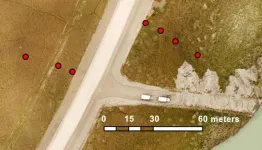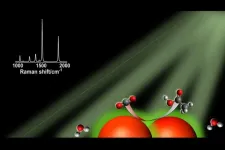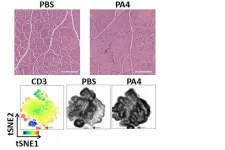New technique for studying cancer mutations - approaches for future therapies
Screening of multiple gene mutations is also applicable for complex nervous and immune diseases
2021-06-24
(Press-News.org) FRANKFURT. Cancer and many other diseases are based on genetic defects. The body can often compensate for the defect of one gene; it is only the combination of several genetic errors that leads to the clinical picture. The 3Cs multiplex technique based on CRISPR-Cas technology developed at Goethe University Frankfurt now offers a way to simulate millions of such combinations of genetic defects and study their effects in cell culture. These "gene scissors" make it possible to introduce, remove and switch off genes in a targeted manner. For this purpose, small snippets of genetic material ("single guide RNA") are used as "addresses" that guide the gene scissors to specific sections of the DNA, where the gene scissors then become active.
The scientists from the Institute of Biochemistry II at Goethe University have expanded the 3Cs technique that they developed and patented three years ago. 3Cs stands for covalently-closed circular-synthesised, because the RNA elements used for CRISPR-Cas are generated with the help of a circular synthesis and are thus distributed more uniformly. With a whole library of such RNA rings, any gene in a cell can be specifically addressed in order to change it or switch it off.
The new 3Cs multiplex technique now even allows the simultaneous manipulation of two genes in one cell. Dr. Manuel Kaulich explains: "We can produce 'address' RNA libraries for all conceivable two-gene combinations. This allows up to several million combinations to be tested simultaneously in one experiment."
Until now, the cost and effort of such experiments was very high; the research group's new technique reduces it, including costs, by a factor of ten. This is because the team can produce the address libraries very uniformly and in high quality thanks to the new 3Cs multiplex technique. "Due to the mediocre quality of the CRISPR-Cas libraries previously available, very large experiments always had to be carried out to statistically compensate for any errors that arose," says Kaulich.
Using the example of various genes involved in degradation processes, the research group demonstrated the potential of the new 3Cs multiplex technique: they examined almost 13,000 two-way combinations of genes that are responsible for recycling processes (autophagy) in the cell. With their help, the cell breaks down and recycles "worn-out" cell components. Disturbances in autophagy can trigger cell proliferation.
"Using the 3Cs multiplex technique, we were able to identify, for example, two genes involved in autophagy whose switching off leads to an uncontrolled growth of cells," explains Kaulich. "These are precisely the autophagy mutations that occur in every fifth patient with squamous cell carcinoma of the lung. In this way, we can search very efficiently in cell culture experiments for genes that play an important role in cancer, and also in diseases of the nervous and immune systems, and that are suitable as possible targets for therapies."
INFORMATION:
The Goethe University research group has applied for a patent for its developments through the university's technology transfer subsidiary Innovectis. The start-up company Vivlion GmbH, spun off from the Institute of Biochemistry II with the participation of Manuel Kaulich, is already offering the use of this technology on the market.
ELSE PRESS RELEASES FROM THIS DATE:
2021-06-24
New research from the University of California, Santa Cruz shows how regional shelter-in-place orders during the coronavirus pandemic emboldened local pumas to use habitats they would normally avoid out of fear of humans. This study, published in the journal END ...
2021-06-24
Roads, bridges, pipelines and other types of infrastructure in Alaska and elsewhere in the Arctic will deteriorate faster than expected due to a failure by planners to account for the structures' impact on adjacent permafrost, according to research by a University of Alaska Fairbanks Geophysical Institute permafrost expert and others.
The researchers say planners must account for the sideward repercussions of their projects in addition to the usual projection of the direct top-down effects.
The finding was presented in a May 31 paper in The Cryosphere, a publication of the European Geosciences Union.
UAF Geophysical Institute geophysics professor Vladimir Romanovsky is among the 13 authors ...
2021-06-24
For the past several years, chemical engineer Michelle O'Malley has focused her research on the anaerobic fungi found in the guts of herbivores, which make it possible for those animals to fuel themselves with sugars and starches extracted from fibrous plants. O'Malley's work, reflected in multiple research awards and journal articles, has centered on how these powerful fungi might be used to extract value-added products from the nonedible parts of plants -- roots, stems and leaves -- that are generally considered waste products.
Now, her lab has discovered that those same fungi likely produce novel "natural products," which could function as antibiotics or other compounds of use for biotechnology. The research is described in a paper titled "Anaerobic gut ...
2021-06-24
The body's immune cells naturally fight off viral and bacterial microbes and other invaders, but they can also be reprogrammed or "trained" to respond even more aggressively and potently to such threats, report UCLA scientists who have discovered the fundamental rule underlying this process in a particular class of cells.
In END ...
2021-06-24
CHAMPAIGN, Ill. -- Researchers report that small quantities of useful molecules such as hydrocarbons are produced when carbon dioxide and water react in the presence of light and a silver nanoparticle catalyst. Their validation study - made possible through the use of a high-resolution analytical technique - could pave the way for CO2-reduction technologies that allow industrial-scale production of renewable carbon-based fuels.
The study, led by University of Illinois Urbana-Champaign chemistry professor Prashant Jain, probes chemical activity at the surface of silver nanoparticle catalysts under visible light and uses carbon isotopes to track the origin and production of these previously undetected chemical reactions. The findings are published in the journal Nature Communications.
Sunlight-driven ...
2021-06-24
By Benjamin Boettner
(Boston) - Muscular dystrophies are a group of genetic diseases that lead to the progressive loss of muscle mass and function in patients, with the incurable Duchenne Muscular Dystrophy (DMD), which affects all the body's muscles primarily in boys, being particularly severe. DMD can be caused by more than 7,000 unique mutations in the largest gene of the human genome, which encodes a central protein in muscle fibers. While this astounding number of mutations all variably block muscle function, the affected muscles share another common feature - chronic inflammation.
As chronic inflammation ...
2021-06-24
Scientists need to focus on tangible efforts to boost equity, diversity and inclusion in citizen science, researchers from North Carolina State University argued in a new perspective.
Published in the journal Science, the perspective is a response to a debate about rebranding "citizen science," the movement to use crowdsourced data collection, analysis or design in research. Researchers said that while the motivation for rebranding is in response to a real concern, there will be a cost to it, and efforts to make projects more inclusive should go deeper than that. Their recommendations speak to a broader discussion about how to ensure science is responsive to the needs of a diverse audience.
"At its heart, citizen science is a system of knowledge production ...
2021-06-24
Parents of children with the most complex medical conditions are more likely to report poor or fair mental health and struggle to find community help, according to a study completed by researchers at University of Rochester Medical Center (URMC) and Golisano Children's Hospital. The study was published in Pediatrics, the journal of the American Academy of Pediatrics (AAP).
The study, "A National Mental Health Profile of Parents of Children with Medical Complexity," examined parent-reported data from the National Survey of Children's Health, and compared three groups: households of children with medical complexity (CMC), households of noncomplex children with special health care needs, and households of children ...
2021-06-24
Not all stresses are created equal, according to a pair of new studies, which shows that distinct ubiquitination patterns underlie cell recovery following different environmental stressors. Eukaryotic cells respond to environmental stressors - such as temperature extremes, exposure to toxins or damage, for example - through adaptive programs that help to ensure their survival, including the shutdown of key cellular processes. These responses are often associated with the formation of stress granules (SGs) - dense cytoplasmic aggregations of proteins and RNA - as well as with ...
2021-06-24
Although the Antibody Mediated Prevention (AMP) study that launched in 2016 failed to show significant efficacy in a pair of clinical trials, Denis Burton argues in a Perspective that the AMP study's results represent a landmark in AIDS research; they show - for the first time - that a broadly neutralizing antibody (bnAb) can protect humans against exposure to some strains of HIV. According to Burton, the AMP study's data - despite not showing a significant difference between the numbers of infected individuals in the treated groups versus those in the placebo groups - still have tremendous implications for future HIV vaccine design and passive bnAb use strategies. The AMP study evaluated the immunotherapeutic ...
LAST 30 PRESS RELEASES:
[Press-News.org] New technique for studying cancer mutations - approaches for future therapies
Screening of multiple gene mutations is also applicable for complex nervous and immune diseases



